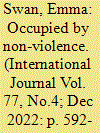| Srl | Item |
| 1 |
ID:
127796


|
|
|
|
|
| Publication |
2014.
|
| Summary/Abstract |
Although most North Koreans say 'yes' in front of power to avoid trouble, they murmur something different behind its back. The main goal of this paper is to investigate the 'hidden transcripts' of the ordinary powerless in contemporary North Korean society. Based on refugee testimonies, the paper examines how mere mortals question, mock, and challenge official rhetoric of the regime at the ever-prospering markets. In particular, a discourse analysis of 'those who think differently' and a practice analysis of 'those who act differently' are provided. The long-term effects of hidden transcripts of the ordinary powerless on the evolution of the North Korean system are discussed in the conclusion.
|
|
|
|
|
|
|
|
|
|
|
|
|
|
|
|
| 2 |
ID:
192925


|
|
|
|
|
| Summary/Abstract |
Liberal peacebuilding has had its fair share of critiques. Along with highlighting its neo-liberal and Western-centric foundations, scholars have also drawn attention to its disregard for Indigenous peace frameworks. Peacebuilding in Palestine is no exception. Based on ethnographic research in the West Bank, this paper examines Orientalist narratives of Palestinian men embedded within the liberal peacebuilding framework and highlights the way that men engaged in unarmed resistance have navigated this terrain through the adoption of public transcripts which (re)narrate the Palestinian story/experience. I argue that this adoption can be interpreted as an act of critical agency where the silencing of their own beliefs is turned on its head to empower and further their agenda and goals. In this way, representation, knowledge, and silence can be understood as not only tools of colonial control, but also tools for Indigenous resistance to Western discourses, narratives, and representations.
|
|
|
|
|
|
|
|
|
|
|
|
|
|
|
|